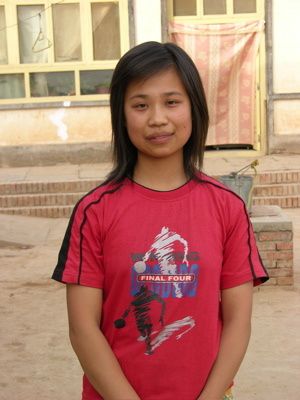First a word to explain my long silence since the last letter in January. It is due to the fact we had to restructure ourselves after my return to Paris, and that responsibility was passed over to Perrine in Beijing. But be assured that silence does not mean inaction: the stipends for the second semester have been secured as usual, the French students of the Lycée Français International in Hong Kong have made their usual and very successful visit to Ningxia, and Perrine has made several trips there to organize our action and to envisage new possible routes of operation.
HONG KONG. In April, Anne-Marie Bordas, a teacher of Chinese at the Lycée Français International of Hong Kong, led a group of students on a visit, the third of its kind, to meet with students from the Yuwang and Ma Gao Zhuang schools. In the account Anne-Marie gives of the village, she evokes “scenes of pure joy and of happiness shared by our students from the Lycée, and the Chinese college students, especially those at Yuwang. Our boys from the second form taught the Chinese students, with their rudimentary Mandarin, to play tag, and we saw the large courtyard behind the college filled with hordes of students, crying and laughing… The same adolescents, a bit earlier in the day, had been covered in dust from gusts of wind whirling up the sand, and armed with spades and hoes, planting trees and creating a new layout for the space around the buildings of the college”. Fundraising activities carried out over several months in Hong Kong allowed the students not to arrive empty-handed. In particular, they realised an old dream: the dream of filling the library of the college at Yuwang, whose shelves had been desperately empty except for some old Maoist brochures from bygone times, which were gathering dust…The French students also brought teaching materials to Zhang Jia Shu, Ma Yan’s native village, for the elementary school children there, and based on a list provided by a doctor responsible for this area, they had bought some medical supplies which they left with the doctor in charge, in Li Jiawa, near Zhangjiashu. This doctor was absolutely delighted at this gesture and he even killed a sheep and offered it to the small group of visitors. The students asked the doctor lots of questions in order to gain an understanding of the healthcare situation. “This initiative was apparently very well received both by the doctor and the local population,” Anne-Maire tells us. These exchanges should continue next year, despite the departure of Anne-Marie who has been in charge of this project from its inception; at least, everyone wishes for it to continue...
NINGXIA. Apart from the stipends and the financial aid given to boarding students, this spring we were able to furnish the new canteen built for the college at Yuwang, upgrading its equipment so that it no longer has much to envy an urban college about, were it not for the poor sanitation which is due to the absence of running water. Perrine, our co-ordinator in Beijing, has made several trips there during the last few months and she has led consultations and deliberations about two ongoing ‘construction projects’ regarding which were are moving ahead with caution: healthcare, and a micro-credit programme.
Regarding healthcare, we have already paid for urgently needed surgery for children or for parents of our stipend recipients, on a case-by-case basis. As Perrine emphasizes, ‘entire families can fall into absolute poverty because of illness’ – hence the idea of a fund for medical surgery in order to deal with the most important cases (how to define these, though?) has been launched now…Could one perhaps adopt the same approach as toward education - help the entire community, but also reserve some funds for those most destitute/impoverished, and to try to establish selection criteria, and stick to them? An ambitious project for this year.
Regarding microfinance, we are in discussion with a Chinese NGO. Perrine and I met the director of this NGO last December. He runs a spectacular micro-credit project for a community of stock-breeders in another part of Ningxia. Perrine has since met with him again and he could extend his activity to the district of Yuwang, where we are operating, and allow our friends to benefit from his experience. The question of how to fund this remains open but discussions are underway, notably with PlanetFinance, an NGO which specializes in microfinance and is already providing this Chinese organization with technical support. Another big project for this year, one which could have considerable impact but requires a big effort, and above all a lot of energy. Fortunately Perrine lacks neither.
FRANCE. The work of the association is going on at a calmer pace in France. After the success of the concert and photo exhibition in December at Sèvres in the Paris area, the operation ‘cookbook’ is in full progress! Our friend Pascale from the Southern branch of the association has had the book with recipes made last year for the benefit of the association reprinted; it has been selling like hotcakes. This book –in french-, entitled Little recipes for a great cause is therefore again available, at a price of €15 (plus transportation costs), the full amount of which will be used for our action on the ground in Ningxia. Do not hesitate to order it and perhaps sell it amongst your acquaintance, a gesture both nice and useful for the support of our friends in Ningxia.
Best wishes
Pierre Haski







